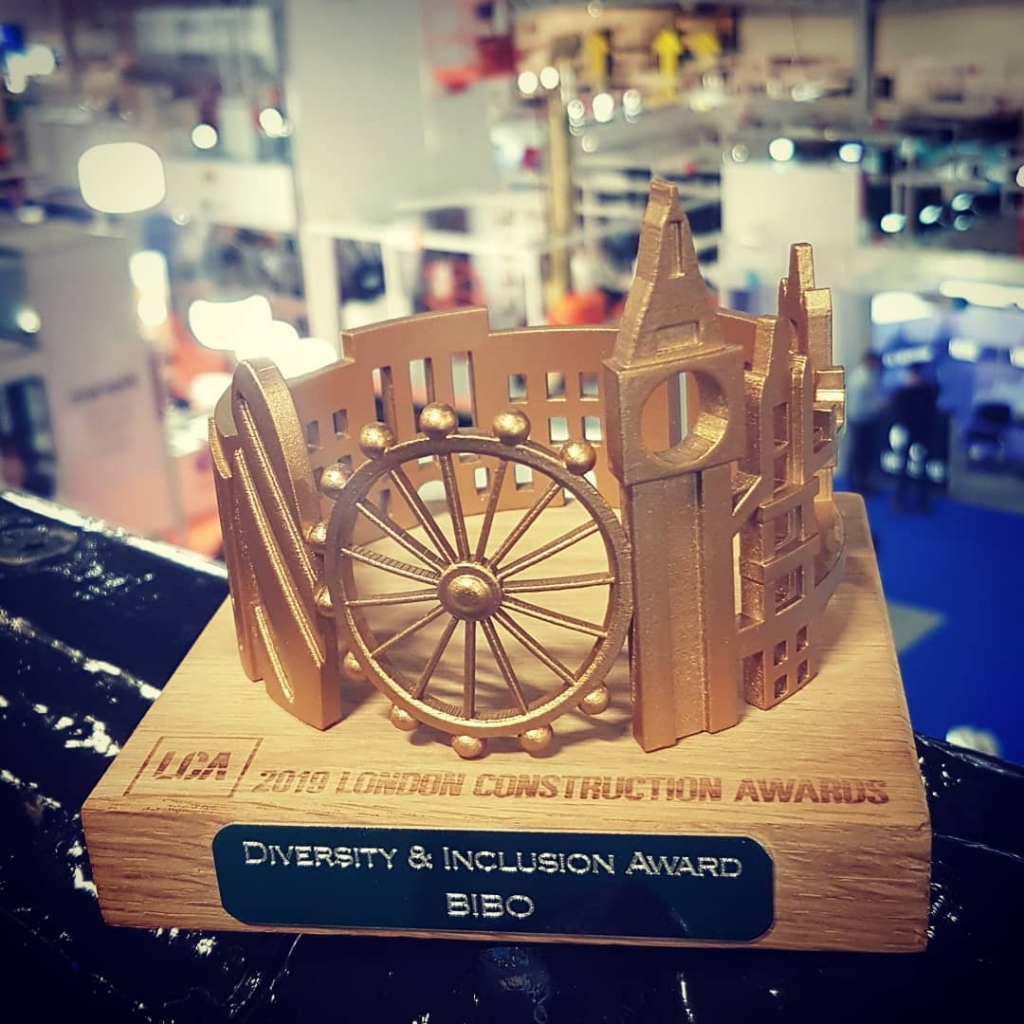Award: Diversity
London Construction Awards @ London Build 2019
After only a year of trading, BiBO caught the attention of the London Construction Awards Judges with our multi-pronged approach to tackling diversity in architecture.

London Construction Award 2019 for Diversity and Inclusion
Most architectural practices in the UK are aware of issues surrounding the Gender Pay Gap and lack of diversity. Many have developed new policies, some have launched internal reviews and identified in-house “champions” but none (that we know of) are questioning the fundamentals of architectural practice. It seems the focus is on fitting round pegs in square holes without questioning whether the hole could become round… or triangular.
BiBO may be yet another small start-up practice, but behind the scenes it is NOT business-as-usual. Here’s what we’ve been doing in our first year:
“Business Image & Values”
What: We’re called BiBO, it stands for “Better In, Better Out”
Why: Our question from the beginning was: “What form can architectural practice take that allows recruitment, retention and promotion of a diverse designforce who in turn have the opportunity to output diversely informed design?” In other words what you put in is what you get out. Diversity and inclusion are so much in our DNA, we named the business for it.
What: We think of BiBO as a design project
Why: BiBO is experimenting with how to give people the opportunity to remain part of architecture throughout life’s challenges. Its intended as a framework bringing together, promoting and rewarding people who may not think, work, design or live like we do. It respects that we don’t know what we don’t know, and is as lightweight and perforated as we can make it to let the unknown in and learn from their experience.
“Diverse Lifestyles: Time Management in Architecture & Work/Life Balance”
What: BiBO is structured on a nominal 4-day week
Why: We think architects need to spend more time participating in the world in order to inform their practice. How can we sympathetically design for other people’s “normal” lives when architect’s lives are so abnormally work-focused? A day to teach, look after kids, make things, read, visit somewhere new, deal with a personal crisis or do absolutely nothing are all “normal” life experiences that enrich us. Applied critically, we hope these experiences will lead to the production of profoundly humane architecture, delivered respectfully.
What: Agile working
Why: Our challenge is to only work when we are productive. For most people in architecture, our work is our hobby. BiBO attempts to harness this enthusiasm and stop work from becoming the chore leading to monotonous copy+paste culture – which isn’t just ugly, it’s unresponsive and dangerous. Agile working opens doors for people who might struggle to find a satisfying place in architecture because of personal constraints such as caring for family or managing health conditions. Armed with laptops and mobile phones we work whenever, wherever needed to get the job done on terms that we can manage. If you need to meet someone, schedule a meeting. If you work best at night, work at night. If your mind is on other things… come back tomorrow.
What: Output focussed
Why: How long does it take to complete a project? For some, a long time, for others maybe not so long. We think 37.5-40 hours a week is an arbitrary number, set and perpetuated by subscribers to status quo. It breeds clockwatching and morale killing comments about “part-timers”. Agree on and meet sensible deadlines, that’s what we care about.
“Inclusive Recruitment”
What: Student prizes celebrating virtues of good design (Joy & Curiosity)
Why: Conscious of the endless flow of money out of architecture into other industries such as recruitment, we decided to give those “fees” to architecture students instead. The bi-product was that the schools of architecture became aware of our recruitment needs at source. N.B., We didn’t even interview our prize-winners this year, we simply put money behind our values and hope those individuals will carry them forward into their careers.
What: Online Pre-Interview Questionnaire
Why: Architectural CV’s are regularly treated as design projects with large amounts of time and money dedicated to producing them – 2 things that can be considered luxuries. To sidestep this, we created a survey asking about working habits, personal interests, and how candidates thought they might sit within the BiBO framework. We looked for self-awareness, willingness to try new things, clear communication skills, and ability to self-motivate, things that are difficult to get across in a CV. “Name?” was the last question, because names can tell you about gender and ethnicity, facts we simply didn’t need to know.
“Retention: Feeling Valued, Career Progression & Pay”
What: Full job descriptions for every post we hope to fill in our 5-year plan
Why: Unclear routes to promotion has been cited as a barrier and a reason why people, women in particular, leave architecture. Our transparent job description document sets out the value that each role, from Part 1 placement to Director, brings to the practice – all have a specific area of expertise. Ready to progress? See what the next job up will require of you, and support your mentee to fill your current post.
What: Disclosure of non-negotiable starting salaries for every job description including directors’ dividends.
Why: Discussion of money is taboo, uncomfortable, opaque and has led to our current culture of gross inequality. At BiBO if you want to know how much someone else is getting paid, look at their job description. Starting salaries are non-negotiable so candidates won’t need to worry that their colleague drove a harder bargain, allegedly also a contributor to the gender pay gap. We think developing such skills are better placed negotiating business deals with clients.
What: Joint administrative title at each qualification gateway.
Why: Overheads contribute to the perception that architects are “expensive”. At the same time, we consider ourselves “underpaid”. We’ve noticed that some of the things typical overheads do (such as quality assurance, business management, organising CPD, and marketing) are the same things that are regularly deficient in Professional Experience Records (PEDRs). So, rather than pay a non-architect to do tasks that an architectural student is seeking experience in… we have coupled the Part 1, Part 2 and Part 3 candidate role with a complimentary administrative title. For example, we now have an RIBA Part 2 Assistant / Business Development Manager. From experience and observation, a young “assistant” might largely get ignored at a networking event, but a BDM is a critical business contact with clout. This young person will be exposed to work-winning situations and develop confidence while building their network; essential career progressing skills.
What: Clear vertical mentorship policy & succession plan from day one
Why: Lack of support is reason cited for leaving the industry. Understanding the roles that lay ahead of you, while respecting the importance of the roles behind you is a great failure in architectural practice. Anecdotally comments always seem to be “The Part 1 is useless, and what’s the Associate got that I don’t?”. As BiBO grows everyone will have 1 junior mentee, and 1 senior mentor in an immediately adjacent role, including at director level – this task is identified in the job descriptions.


























